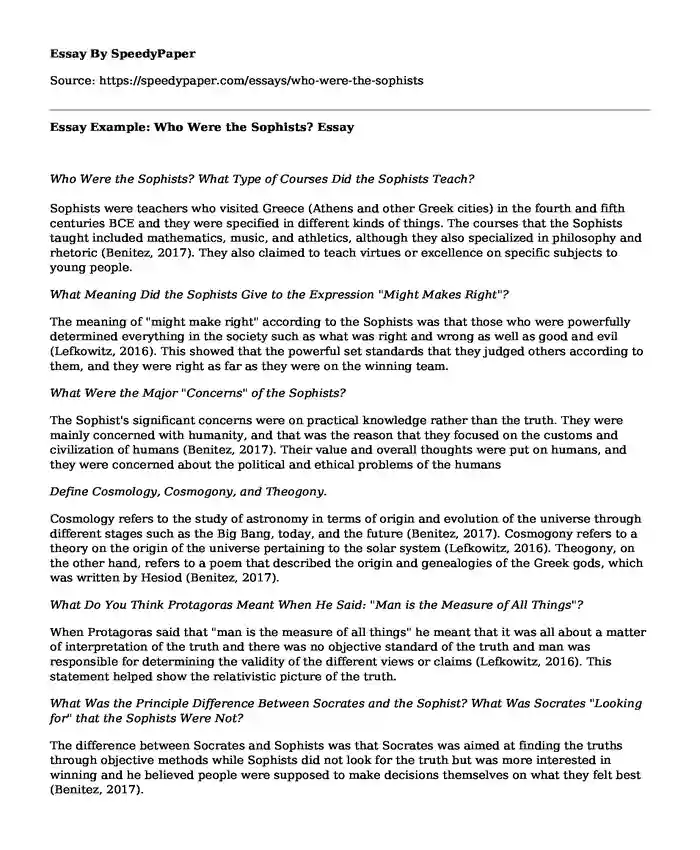
| Type of paper: | Literature review |
| Categories: | Philosophy Ancient Greece |
| Pages: | 2 |
| Wordcount: | 457 words |
Who Were the Sophists? What Type of Courses Did the Sophists Teach?
Sophists were teachers who visited Greece (Athens and other Greek cities) in the fourth and fifth centuries BCE and they were specified in different kinds of things. The courses that the Sophists taught included mathematics, music, and athletics, although they also specialized in philosophy and rhetoric (Benitez, 2017). They also claimed to teach virtues or excellence on specific subjects to young people.
What Meaning Did the Sophists Give to the Expression "Might Makes Right"?
The meaning of "might make right" according to the Sophists was that those who were powerfully determined everything in the society such as what was right and wrong as well as good and evil (Lefkowitz, 2016). This showed that the powerful set standards that they judged others according to them, and they were right as far as they were on the winning team.
What Were the Major "Concerns" of the Sophists?
The Sophist's significant concerns were on practical knowledge rather than the truth. They were mainly concerned with humanity, and that was the reason that they focused on the customs and civilization of humans (Benitez, 2017). Their value and overall thoughts were put on humans, and they were concerned about the political and ethical problems of the humans
Define Cosmology, Cosmogony, and Theogony.
Cosmology refers to the study of astronomy in terms of origin and evolution of the universe through different stages such as the Big Bang, today, and the future (Benitez, 2017). Cosmogony refers to a theory on the origin of the universe pertaining to the solar system (Lefkowitz, 2016). Theogony, on the other hand, refers to a poem that described the origin and genealogies of the Greek gods, which was written by Hesiod (Benitez, 2017).
What Do You Think Protagoras Meant When He Said: "Man is the Measure of All Things"?
When Protagoras said that "man is the measure of all things" he meant that it was all about a matter of interpretation of the truth and there was no objective standard of the truth and man was responsible for determining the validity of the different views or claims (Lefkowitz, 2016). This statement helped show the relativistic picture of the truth.
What Was the Principle Difference Between Socrates and the Sophist? What Was Socrates "Looking for" that the Sophists Were Not?
The difference between Socrates and Sophists was that Socrates was aimed at finding the truths through objective methods while Sophists did not look for the truth but was more interested in winning and he believed people were supposed to make decisions themselves on what they felt best (Benitez, 2017).
Reference
Benitez, E. (. (2017). The Sophists and Socrates. Ancient Philosophy, 225-252. doi:10.4324/9781315179339-7
Lefkowitz, M. (2016). Euripides, Socrates, and Other Sophists. Euripides and the Gods, 24-48. doi:10.1093/acprof:oso/9780199752058.003.0002
Cite this page
Essay Example: Who Were the Sophists?. (2023, Feb 07). Retrieved from https://speedypaper.net/essays/who-were-the-sophists
Request Removal
If you are the original author of this essay and no longer wish to have it published on the SpeedyPaper website, please click below to request its removal:
- Music in My Life - Essay Example
- 800 Word Essay Sample: Writing Guide and Free Samples
- Book Review Essay Sample. Ta-Nehisi Coates - Between the World and Me
- Scholarship Application, Essay Example
- Free Essay Sample about Pollution Prevention Audit
- Essay Example: The Role of Music in Movies by Bridgette Redman
- Research Paper on Water in New Mexico
Popular categories




